Key takeaways:
- Flexibility and contingency planning are essential for addressing unexpected venue challenges like weather changes or access restrictions.
- Effective communication among all stakeholders, including vendors and venue staff, is crucial to avoid logistical issues and enhance attendee experience.
- Conducting thorough site visits and understanding the venue’s limitations can prevent complications related to layout and equipment capacity.
- Documenting all communications and agreements helps prevent misunderstandings and provides a reference for future events.
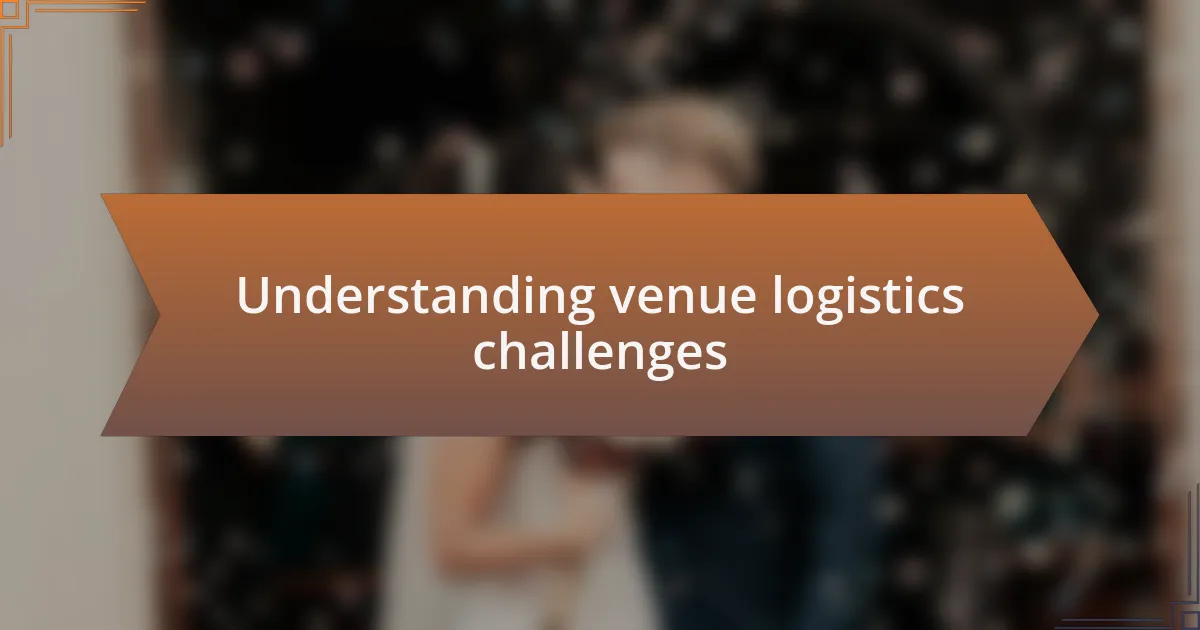
Understanding venue logistics challenges
When diving into venue logistics challenges, I often think about the unexpected issues that can arise, like last-minute changes in guest count or unexpected weather conditions. I remember a time when our outdoor event was suddenly threatened by rain, leaving us frantically scrambling for an alternative location. This experience taught me that flexibility is key; always have a contingency plan ready!
What really struck me was how the layout and flow of an event can greatly impact logistics. Just think about it: how many times have you walked into a venue and felt lost or overwhelmed? I’ve been there, trying to navigate through cramped spaces. It made me realize that a well-thought-out setup can minimize confusion and enhance the overall experience for attendees.
As I reflect on my experiences, I realize that communication is essential in tackling venue logistics challenges. Ensuring everyone involved, from catering teams to audio-visual technicians, is on the same page can significantly reduce potential hiccups. Have you ever been at an event where something went wrong due to a lack of clear communication? It’s frustrating, isn’t it? Learning to establish effective communication protocols early on has saved me from many stressful moments.
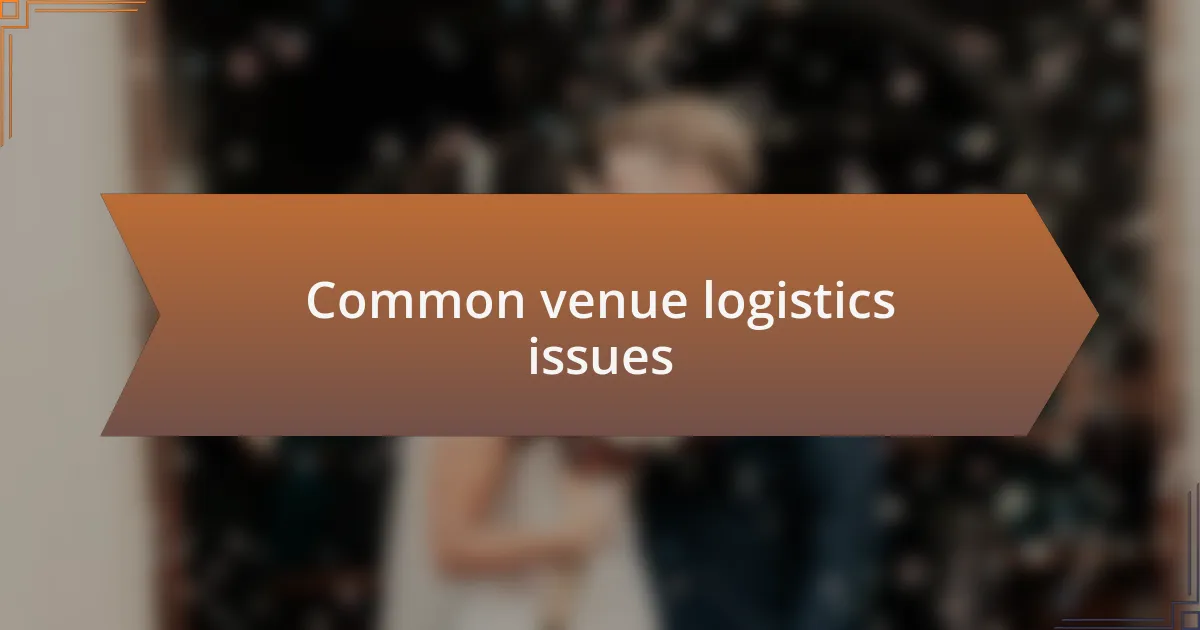
Common venue logistics issues
One common venue logistics issue I’ve faced repeatedly is dealing with unexpected access restrictions. I recall a situation where we had to load in equipment through a back entrance rather than the main one due to an unforeseen event at the venue. This not only complicated the setup but also added stress to the team. Have you ever tried to navigate tight spaces with heavy gear? It can be a real test of patience and teamwork.
Another issue that often crops up is technical difficulties with equipment, which can happen no matter how advanced the venue is. During one event, the sound system failed right before the keynote speaker was about to begin. I could feel the anxiety rise as we scrambled to troubleshoot while the audience was seated and waiting. It’s moments like these that make me appreciate the importance of having a reliable tech team on hand. How would you manage if the microphone suddenly went quiet at a critical moment?
Lastly, I’ve encountered logistical nightmares stemming from inadequate parking or transportation options for guests. At one particularly busy exhibition, the parking lot was already full by the time many attendees arrived, leading to confusion and frustration. I learned the hard way that providing clear directions or even arranging shuttles can make a massive difference in ensuring a smooth attendee experience. Have you ever found yourself lost in transit to an event? It can set the tone for the entire experience, doesn’t it?
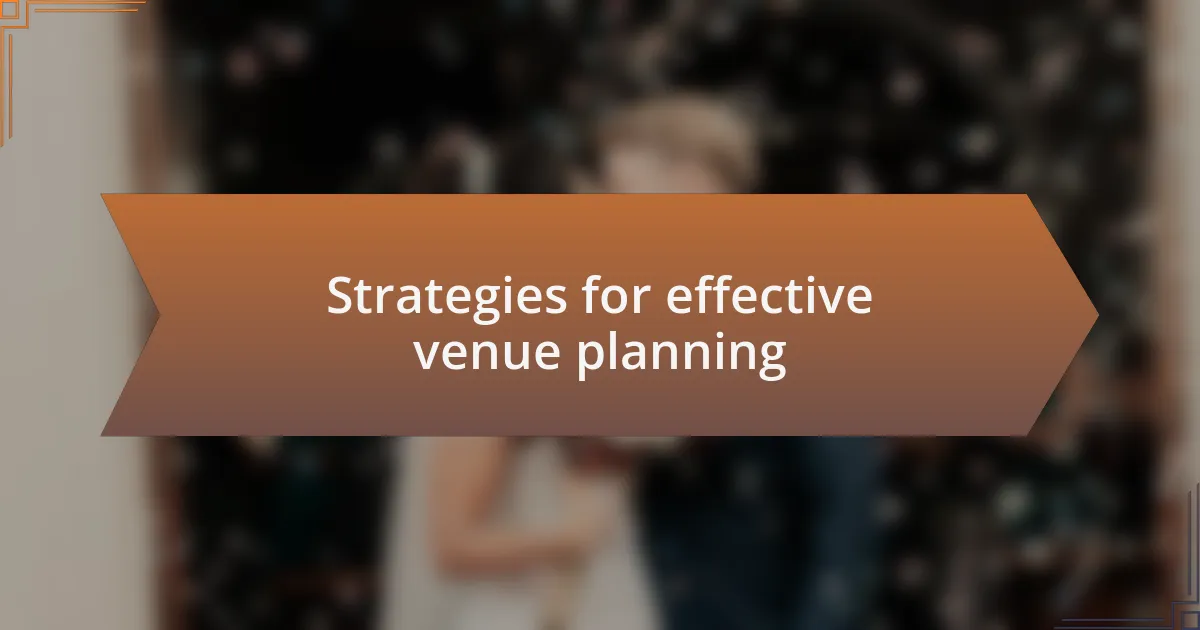
Strategies for effective venue planning
When it comes to effective venue planning, one strategy I often rely on is conducting a thorough site visit well in advance. I remember a time when I walked through a venue to visualize the flow of an event, and it completely transformed my perspective on layout options. Have you ever stood in a space and just felt the energy? This pre-planning phase allows me to identify potential challenges early and adjust my layout accordingly, ensuring a seamless experience.
Collaboration with venue staff is another crucial element of successful venue planning. During one event, I made it a point to engage with the venue manager to discuss logistics in detail. Their insights were invaluable! I discovered unique ways to enhance accessibility and streamline services. When was the last time you tapped into the expertise of a venue team? Trusting their knowledge can significantly ease the process and reveal solutions I hadn’t considered.
Finally, I always prioritize communication with all stakeholders involved. Before an event, I create a shared timeline with vendors, staff, and clients to keep everyone aligned. Once, during a complicated festival, miscommunication led to food vendors arriving late, which created a ripple effect impacting guest satisfaction. Clear communication avoids these pitfalls. Have you ever faced a situation where a lack of updates created chaos? Keeping everyone informed can make all the difference in smooth event execution.
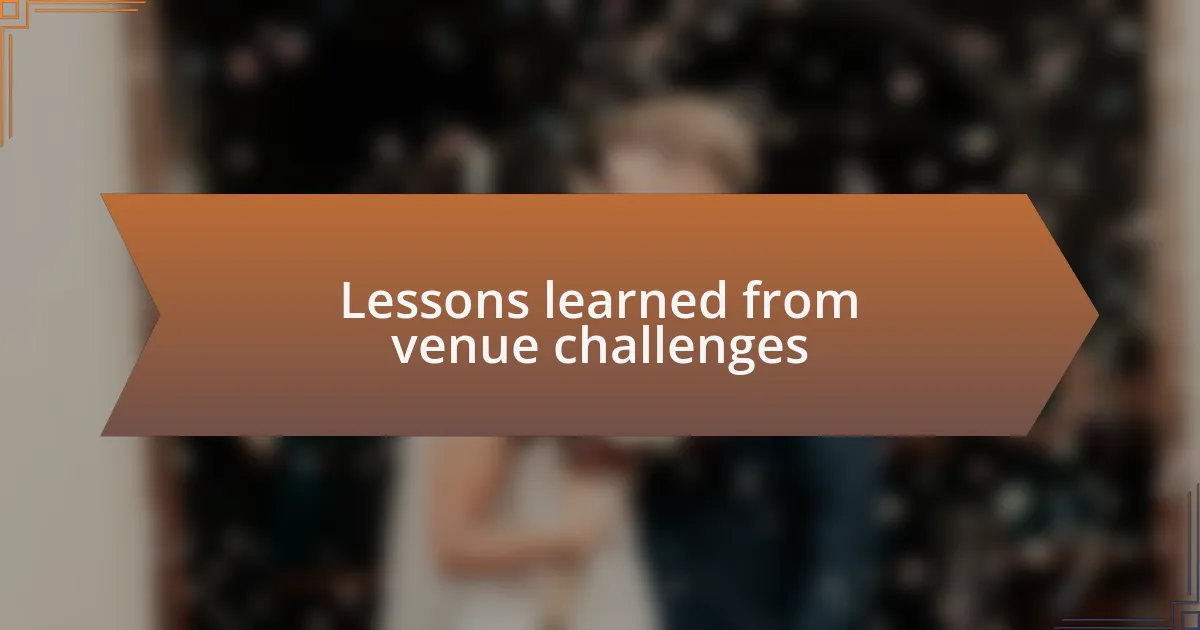
Lessons learned from venue challenges
One lesson I’ve learned from venue challenges is the importance of flexibility. I recall a time when the venue unexpectedly changed its layout just days before an event. At first, it felt like a disaster; however, it forced me to think creatively and adapt quickly. Have you ever found yourself in a situation where you had to pivot on the fly? That experience taught me that staying open-minded can lead to innovative solutions to last-minute challenges.
Another key takeaway revolves around the significance of understanding the venue’s limitations. During an event, I underestimated the capacity of the power supply, leading to frustrating moments when equipment failed. It was a tough realization. I learned that knowing the limitations of a space is as critical as knowing its strengths. Have you ever assumed a venue could handle more than it truly could? My advice is to ask detailed questions about every facet of the space before finalizing your plans.
Lastly, I can’t stress enough the value of documenting everything. After dealing with multiple venue mishaps throughout my career, I’ve adopted a habit of keeping detailed records of all communications and agreements. On one occasion, this saved me from a costly misunderstanding when a venue manager insisted on a different setup than what we had agreed upon. How often do you find yourself in debates over what was said or promised? Thorough documentation can not only prevent conflicts but also provide a historical reference that can guide future events.
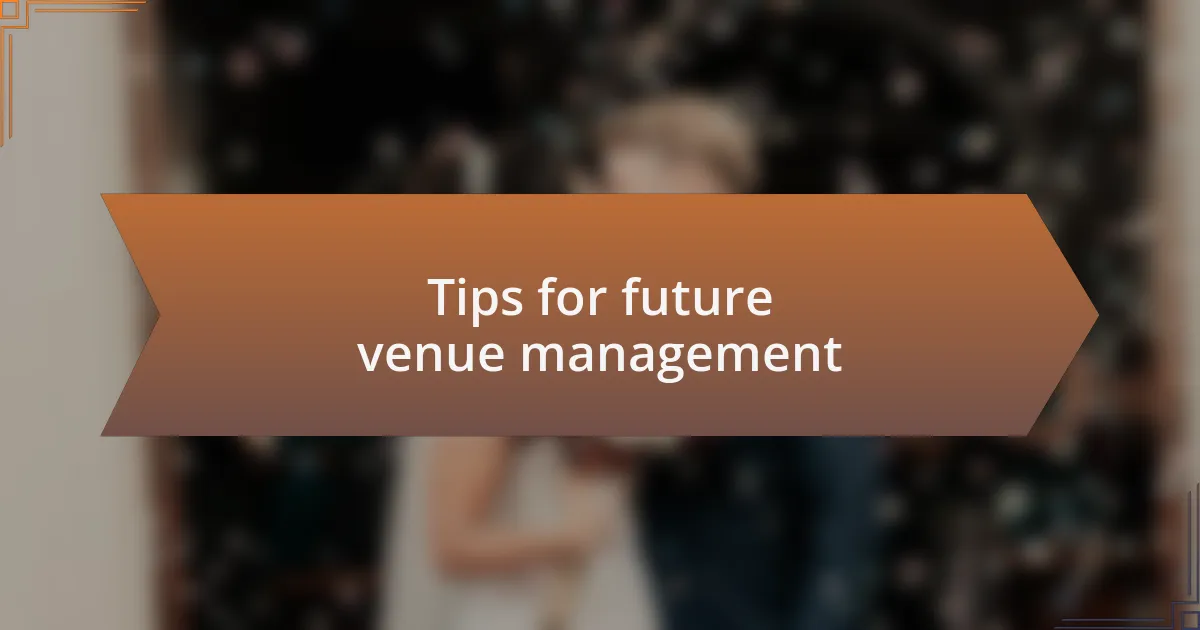
Tips for future venue management
When managing a venue, establishing a solid line of communication with all stakeholders can make a significant difference. I learned this firsthand during a particularly hectic event when our catering team had different timing expectations than the venue staff. It was a scramble to make adjustments on the day of the event. Have you ever felt the pressure of last-minute changes? I realized that regular check-ins and clear communication can prevent confusion and ensure everyone is on the same page.
Paying attention to the details of the venue layout is also vital. I once organized a conference and overlooked the space between the stage and the audience. It was awkward when speakers shared their passion, but the audience felt disconnected. Wouldn’t it be great if your setup encouraged engagement? I now always visualize the space from an attendee’s perspective, which has greatly improved the events I manage.
Finally, don’t underestimate the power of a contingency plan. During an event, a sudden storm knocked out power, and I had to quickly implement backup protocols. It was stressful, yet ultimately, it taught me the necessity of being prepared for the unexpected. Have you considered what could go wrong at your next event? Having a backup plan not only reassures you but also provides peace of mind to your team, ensuring that you can focus on creating a memorable experience.